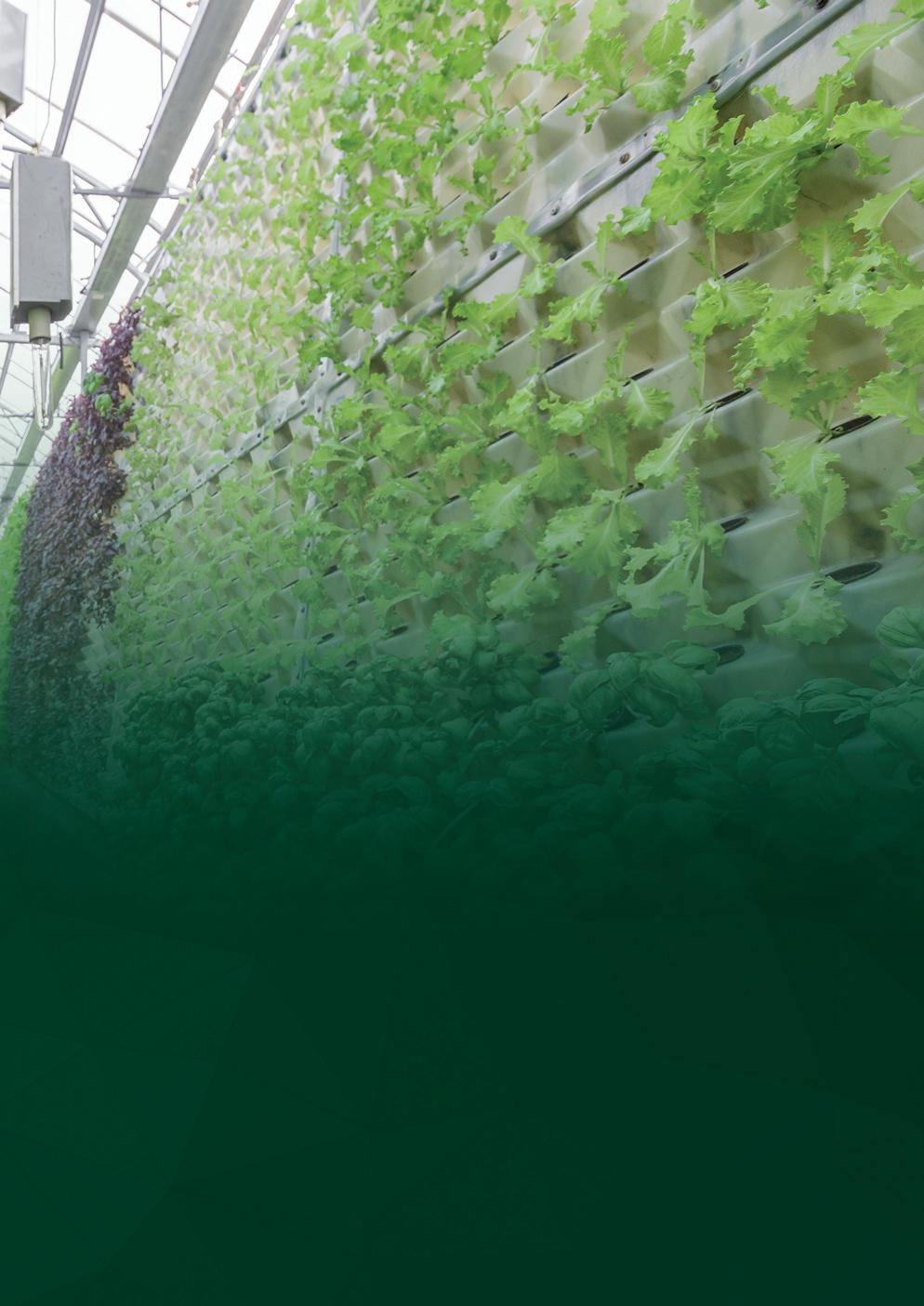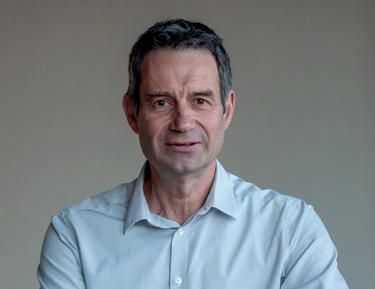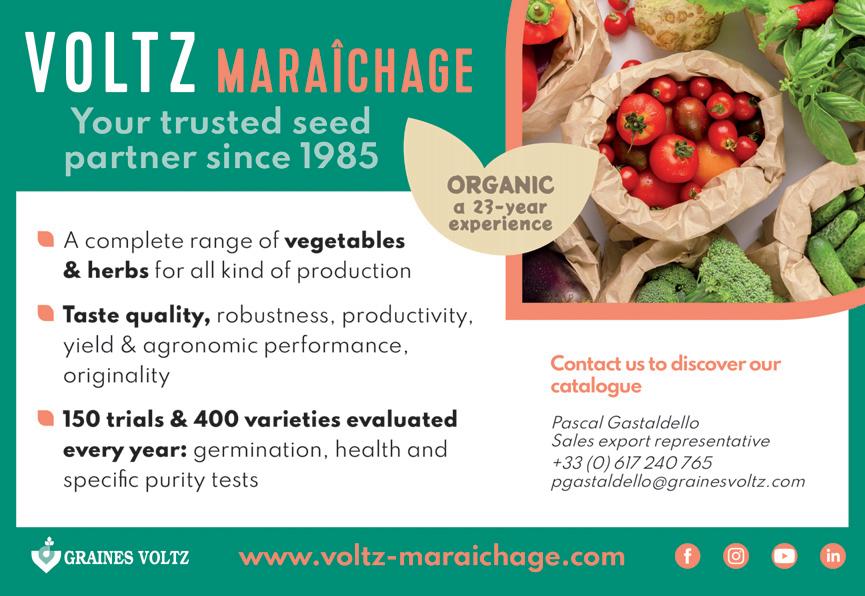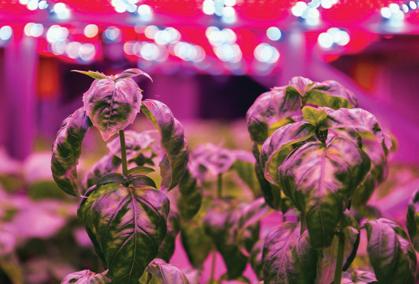
6 minute read
Growing greatness in seed business
GRAINES VOLTZ I PROFILE
Graines Voltz bears the family surname of its proud owner Serge Voltz, who established Graines Voltz in 1985. Thanks to his vision over 30 years ago, the company is today one of the largest independent European distributors of seeds and young flower and vegetable plants. Wolfgang Fischer, International Sales Manager for the Maraîchage division of Graines Voltz, spoke to Richard Hagan about the international vegetable seeds business and the future of farming.
Advertisement
Graines Voltz, based in France, is one of the largest independent distributors of seeds, young flower and vegetable plants in Europe.
In order to best serve its client base, the company is divided into two main divisions: Voltz Maraîchage and Voltz Horticulture.
Voltz Maraîchage selects, develops and distributes the best varieties of vegetables, aromatics, herbs and edible flowers throughout France, Europe and the rest of the world. These products, both organic and conventional, are intended for professionals in the food production business, such as farmers and other commercial entities.
Voltz Horticulture offers, throughout the year, a wide range of flowers and vegetables for cities, gardens, and private balconies and terraces. These products are intended for professionals: horticulturists, nurserymen, landscapers, private and public communities.
The two separate divisions exist due to the differences in the expertise required to sell into the company’s different markets, as
Wolfgang Fischer, International Sales Manager for the Maraîchage division, clarified.
“If you meet with the Maraîchage team, they’ll ask you how many seeds you need to plant per hectare and about how long it takes to produce the plant in a particular location. At harvest time, all of the fruit will be harvested at once, given that it’s a commercial farm.
Facilities ripe for success
Voltz Maraîchage has firmly positioned itself as a major player within the vegetable production business thanks to comprehensive facilities strategically located across Europe.
Two main facilities are located in France: one in Colmar in the east, and the other in Brain-sur-l’Authion near the west coast. The Colmar facility is within the region in which the company was founded and today serves as its head office, housing its financial, administrative, IT and marketing teams. The Brain facility was built in 2004 and is strategically located in the midst of France’s vegetable-growing region. This is the company’s operational centre and home to its warehousing, seed processing and shipping operations.
In addition to these two French locations, the activities of Voltz Maraîchage are supported by a significant seed breeding and research facility in Germany. Outside of these, the division deploys sales teams in strategically important European markets, specifically Germany, Spain, Portugal and Italy.
Voltz Maraîchage’s catalogue consists of 75 species and more than 2,500 diversified varieties in seeds and young plants.

VOLTZ Maraîchage International Sales Manager Wolfgang Fischer


GRAINES VOLTZ I PROFILE


Of these, its most popular range is its aromatic herbs, with its bedding plants (chive, basil, parsley) and sweet potatoes a close second and third.
The company’s aromatic herbs have been a global success, fuelled by a catalogue of seeds developed specifically to suit the climates and soil conditions of its main markets, and sold by an expert sales team.
“Using our product knowledge and experience, we help our customers decide which seed varieties are best for their particular needs,” Mr Fischer noted.
Exclusive genetics
In 2020, Graines Voltz gave its growth trajectory a shot in the arm with its acquisition of the business portfolio of the German vegetable and herb breeding specialist Hild Samen. This was a hugely strategic acquisition for the activities of the division Voltz Maraîchage as it effectively upgraded the division’s value proposition from being a distributor and dealer of seeds, to now also being able to cultivate and breed its own unique seed varieties. It has also opened the door to the division building its own portfolio of genetic material unencumbered by third-party relationships, limitations and other restrictions.
The purchase of Hild has catapulted Voltz Maraîchage into becoming a truly international seed distributor, able to develop and offer seeds customised for any number of climates and customer requirements.
“Our future investments will be aligned with our goal of establishing new genetics and our own varieties of seeds for markets in many parts of the world,” Mr Fischer confirmed.
Operating its own breeding infrastructure also allows Voltz Maraîchage to proactively respond to changes in the market. A recent example of this was the widespread emergence of downy mildew – a type of fungus – in basil plants. With basil being one of its keystone products, the situation for Voltz Maraîchage was worrying and the need for a solution was urgent.


Thanks to its breeding capacity, Voltz Maraîchage was able to immediately get to work breeding a downy mildew resistant strain of basil, giving the division a key competitive advantage in the market versus other dealers who didn’t have access to the same material.
“We didn’t have to wait for someone else to breed a resistant seed,” Mr Fischer commented. “Our breeding facility means that we’re able to react immediately. We’re steering the market, we’re no longer behind.”

Farming, but vertically
Voltz Maraîchage’s latest expansion plans have taken it into the vertical farming sector, which the division has identified as a key long-term growth industry and a major direction it expects farming to go in, in future: The reason? “Vertical farming is close to the point of sale, you can produce throughout winter and it requires 90% less water than traditional farming,” Mr Fischer explained.
With the benefit of previous vertical farming experience within Hild, Voltz Maraîchage is actively collaborating with the vertical farming industry to develop seed varieties specifically suited for the industry’s needs. But it’s not as simple as you might think.
“It’s a completely different world for the plants because the lighting and temperature are consistent,” said Mr Fischer. “That means the seeds only need to be bred for a single usage scenario –you don’t need to adjust them for different seasons, weather or sunlight conditions. For example, they don’t have to be resistant to stormy weather, or varying sunlight.”
To ensure a complete strategic focus on its vertical farming initiatives, Voltz Maraîchage has developed a vertical farming subdivision. This tight-knit group has developed close partnerships within the vertical farming community, with whom they openly share experience, knowledge and general learning. Mr Fischer pointed to a recent example of a collaboration with farmers, in troubleshooting problems with vertically-farmed basil.
“The farmers complained that while the basil grew very successfully, the taste was not there, and so we had to figure out why,” he said, chuckling. “There was a huge learning process the whole way through. That conversation between us as the breeder and them as the grower is so important.”
Today, Voltz Maraîchage has developed 26 varieties of aromatic herbs specifically for vertical farming. Some varieties are additionally selected for greenhouse production or for hydroponics.
With growing experience in vertical farming, successful breeding programs and a growing list of successes in markets around the world, Voltz Maraîchage is firmly on track to reach its goal of becoming a major competitor beyond European borders.
“Our strategy is clear: we want to be more global,” said Mr Fischer, concluding. “We want to raise our profile overseas in countries like the US and Australia: but we will never forget the local producers. We love both big and small customers and being close to them, so while we pursue international growth, we’ll continue to ensure that we always have sufficient sales representatives to keep all of those relationships strong.” n



